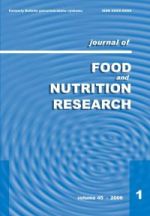Scientific journal
Journal of Food and Nutrition Research
Summary No. 4 / 2020
Molnár, R. – Molnár, J. – Beke, D. – Papp, B. – Kuti, R.
Shelf life of bottled water – field conditions in Hungary
Journal of Food and Nutrition Research, 59, 2020, No. 4, s. 361-366
Rita Molnár, Department of Food Science, Faculty of Agricultural and Food Sciences, Széchenyi István University; Var Square 2, H-9200 Mosonmagyaróvár, Hungary. E-mail: molnar.rita1222@gmail.com
Received 13 July 2020; 1st revised 28 October 2020; accepted 30 October 2020; published online 4 December 2020.
Summary: Professional soldiers and firefighters are deployed to deal with the consequences of various disasters, where their supply is carried out under field conditions. This study investigated whether improperly stored bottled drinking water can change its quality and pose a biological hazard. Microbiological quality of 20 samples of bottled mineral water produced in Hungary, including 10 uncarbonated, 5 carbonated and 5 flavoured mineral water samples, was investigated under field conditions. Culturable microorganisms were enumerated by ISO 6222:1999; coliforms and Escherichia coli by ISO 9308-1:2000; Pseudomonas aeruginosa by ISO 16266:2006; Enterococcus spp. by ISO 7899-2:2000; and Clostridium perfringens by ISO 14189:2013. In six cases among uncarbonated water samples, the aerobic colony counts exceeded the standard value. Furthermore, coliforms and P. aeruginosa were detected in three cases. However, in carbonated and flavoured mineral water, no samples of unacceptable bacteriological quality were observed, as their pH value was significantly lower and that probably did not favour proliferation of bacteria. Due to their acidic condition, carbonated and flavoured mineral water appears to be less vulnerable to microbiological contamination under field conditions. During flood damage remediation, it is advisable to perform the supply of intervention units with carbonated and flavoured mineral water to avoid infection.
Keywords: drinking water supply; biological hazard; water storage; mineral bottled water
Download:
(pdf, 226.29 Kb, 1117x)









